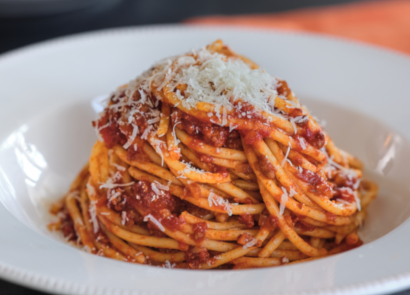How many times have you been told to trust your gut? It’s advice as old as time, and while some people seem to be able to tap into their intuitive thoughts fairly easily, for others it can feel virtually impossible to practice, or a little bit too ‘woo-woo’ to even try. But, knowing how to listen to the messages your body is trying to tell you can help on all sorts of levels and having faith in your intuitive thoughts can bring untold benefits. So, just how can we tune in to our inner wisdom? We speak to experts in the field and women who have followed their gut instincts…
Thirty-eight-year-old Emma Mulholland had long had a nagging feeling in her gut that something wasn’t quite right, but it wasn’t until she followed her instinct last year that she found an answer for her disquiet.
“I’ve always been an extremely sensitive and intuitive person and have had an intermittent history of clinical depression and anxiety for the whole of my adult life – yet I have had this constant sense that there was something more, which I couldn’t quite put my finger on,” she tells us. “While I’d always done well at school on the whole and had even practised as a civil and commercial litigation lawyer until a couple of years ago, I found it unbearably stressful to live up to the demanding working culture. I felt as though behind my mask, I was a mess and I beat myself up for not being a so-called ‘proper’ adult.”
After listening to someone explain how they had been diagnosed with ADHD, Emma had what she calls a lightbulb moment. “As I sat there and listened, a strange sensation began to engulf me and that feeling grew until I finished the call. I felt like I’d had an epiphany; it was as though a giant lightbulb had gone on in my head and my instincts were on fire.”
Despite some friends and family members being dismissive of her suggestion, and even her own doctor saying she was too ‘academically successful’ to have the condition, a year or so later and Emma has now received a professional diagnosis.
“I felt – and still feel now – an overwhelming sense of relief,” she says. “Finally, I have an explanation for so many things and can allow myself to believe that I’m not just someone who is rubbish at ‘adulting’. People have said they admire my bravery, tenacity and determination with trusting my gut feelings and I’m so thankful that I have this internal sat nav to rely on.”
Emma’s story is just one example of how our gut instincts can be telling us something important, and many of us will have had similar experiences. Perhaps you just ‘knew’ that a house was right for you as soon as you walked through the door, or maybe you had a sense that a new job opportunity would be perfect without knowing why. Sometimes they might not seem to make a lot of logical sense, but our gut instincts can certainly guide us towards a positive decision or action. So, how exactly do they work?
The science
“Most people will have been in a situation where they have a deep feeling about a direction they should take. They might not be able to put that feeling into words but they simply know,” says Heidi Hauer, a holistic health and life coach who writes about learning to follow your intuition in her book The Queendom Within – Rewrite Your Fairy Tale and Create Your Own Happily Ever After (heidihauer.com).
“Studies suggest that our subconscious mind can process significantly more data than our conscious mind. So just because you cannot logically explain your gut instinct, doesn’t mean that no processing of information has taken place. The biological background to that is that the gut communicates information to the brain and vice versa via the vagus nerve, through the gut-brain axis.”
In other words, what we feel in our body is often a result of processes taking place in the brain. Although we might not be aware, our brain is constantly making a rapid appraisal of any given situation – using memories of previous situations and past experiences – and the feeling this creates in our bodies can help us make swift decisions in the present.
This is what makes our gut instincts so powerful – their ability to see what the brain does not (or perhaps more accurately, what the brain hasn’t yet articulated).
“Our gut instinct keys into our emotional awareness and intuition,” explains psychotherapist and coach Andre Radmall (andreradmall.com). “It may seem less rational than our conscious thinking but it’s also more likely to pick up what the rational mind fails to see, such as atmospheres and the emotional state of other people. It is therefore a key part of our emotional intelligence and social awareness.”
Research has helped demonstrate the existence and reliability of intuition and gut instincts. Famed psychologist Nalini Ambady, for example, found that first impressions really do count when she showed participants silent 10-second video clips of professors and asked them to rate the instructors’ effectiveness. Interestingly, what they said then correlated strongly with the ratings they gave them at the end of their college term. And researchers at the University of New South Wales found that people do use unconscious emotional information to help them make decisions in a breakthrough experiment in 2016.
When anxiety takes over
So are our instincts always right? Experts would say that we can trust them more than we believe, but problems can arise when anxiety comes calling. Sometimes our worries can take over, and we can misread these signals as coming from our gut.
“Similar to our gut instinct, all our feelings are also accompanied by a physical sensation,” says Heidi. “Therefore, it’s easy to get things mixed up if you are not paying enough attention to where the sensation is coming from. The key question to answer is: Am I shying away from this experience because it requires me to go beyond my comfort zone or does my gut tell me I better stay away from it? An example of this would be speaking on a stage. It’s common for a situation like this to provoke feelings of anxiety. Perhaps your inner critic starts to bring up negative feelings, or your inner perfectionist causes thoughts of worry related to performance. Your fight or flight responses relating to anxiety might be urging you to run away, but what does your gut say?”
Andre agrees. “These sorts of fears may originate in the self-protective parts of the brain, and listening to our gut may tell us a different story,” he adds. “I think our gut may be a more accurate judge of what we need as opposed to the story-making brain that can tell us all kinds of anxietyprovoking narratives.”
But how can we tell the difference? According to Heidi, often gut instincts are clear, precise and direct, whereas the mind likes to mull things over, create stories, justifications and reasons as to why we should or should not do certain things.
“If we act in response to fear, we tend to question ourselves over and over again, overthink decisions, and play out different scenarios in our head,” she says. “If this is you, try to connect with that initial feeling before the thinking mind takes over.”
Breaking through the noise
It’s clear that listening to our gut isn’t always easy – sometimes it might be telling us something we don’t want to hear (that a relationship is failing, for example) and other times we might not be able to hear it above the hum of everyday life.
In Nichola Henderson’s situation, it took her a while to be able to truly pay attention to her gut and leave a stressful job.
“I used to work in a corporate environment – it was fast-paced, demanding and target-driven and I was not living how I was supposed to,” she says. “Looking back now it’s easy to see my gut instinct had been telling me to leave for a while, but I didn’t recognise it at first. I felt like something ‘wasn’t quite right’ but I couldn’t put my finger on it exactly.
“It was like a general discomfort – an inner itch and a nagging feeling that wouldn’t go away. It was a sense that I was supposed to be doing something else, something more meaningful, but I continued to power through regardless until that feeling became so strong, I was forced to do something about it.”
When she finally listened to her body, she booked a three-week solo trip to Bali where she took time to reconnect to herself. “It was the best thing I ever did and everything I did after that seemed to make more sense as I learned to listen to my gut. I guess it was like a reset for me.” Since then, Nichola has switched careers and is now a life coach, helping others tune into their instincts and follow a path that brings them happiness.
How to listen to your gut
Her advice is to learn to trust yourself. “I always tell my clients that they are their own best coach and no one knows what is best for you other than yourself,” she explains. “Sometimes it’s just that your little voice of inner wisdom has become lost in the noise of everyday life, like a soft piano playing behind a brass band. The key is realising that it’s still there and it hasn’t been lost – it’s just been drowned out by everything else going on. In these cases, it’s about finding the best way to uncover that and tune into that wisdom again without putting too much pressure on yourself.”
Follow our experts’ advice on how to do this below…
Switch off your chattering mind
“There are several ways to tune into the gut,” says Andre, “and they all involve switching off the chattering mind and tuning into just being in the present moment. Meditation is very helpful for getting out of your head and into the body and breathing deeply from the diaphragm will put you more in touch with the gut.”
Not a fan of meditation? Don’t worry. “If you shy away from meditation, don’t underestimate the power of sitting quietly with a cup of tea, putting your phone down or taking regular walks in nature,” adds Heidi. “This might bring you into your body and limit your tendencies to overthink. Notice what arises when you disconnect from the busyness of life.”
Try a body scan
If you want to really tune in to your body, Andre says the mindfulness technique of doing a ‘body scan’ can help. “This means relaxing while becoming aware of the body, scanning gently from head to toe,” he explains. “This is purely an observation exercise to notice any areas of tension, pain or restriction. These feelings may also reveal gut feelings.”
Wait for your intuition
We tend to imagine that gut instincts show themselves immediately, but this isn’t always the case. “If you’re struggling with a decision sometimes it’s good to switch off and do something else,” advises Heidi. “This allows your gut to have a space in the decision-making process. Often, the answer will pop up when you least expect it.”
Get writing
According to Andre, journaling and noting down dreams can be very helpful in opening up our awareness of gut level feelings.
Heidi agrees. “For mental processes, journaling is a great way to declutter your thoughts and get to the core of the question or issue you are dealing with,” she says. “Remember that journaling doesn’t have to be about documenting your day. Simply put pen to paper and write down everything you are thinking. You’ll be amazed by what comes up.”
Be good to your gut
Just as we can encourage our brains to think more clearly and our body to work more efficiently, so too can we nourish our gut and help hone our instinct, according to Heidi. “Moving your body and eating cleaner can help you get back into balance which strengthens that connection with your gut instincts,” she explains.
“For example, sugar and caffeine create fluctuating moods that can interfere with what we are thinking and feeling, meaning that we’re not always able to make decisions from a grounded, truthful place. Any chemical or toxins we absorb through our food or drinks or the environment we live in can disconnect us from ourselves, taking us away from our centre. We can also say this about external stimuli, such as heavy media consumption, which can put us in an information overload and override our inner voice.”
Hone your skills
Once you’ve started to recognise what your gut instinct is and how your own sense of intuition works, try practising your skill. Andre suggests setting aside time every day to listen to what your gut may be telling you. Try taking note of what it says in different situations too – for example, when you enter a new environment or meet a new person.
If you feel that you need to check what your instincts are telling you, Andre has another recommendation: “To check your gut instinct is on track it is helpful to talk to others whose instincts you trust,” he says. “I think our gut instinct thrives in an environment where you are being listened to by others.”
For women such as Emma and Nichola, the most important thing is not to ignore your gut when it’s trying to tell you something. “Don’t give up or ignore your intuitive feelings – particularly when they are strong and repetitive,” says Emma. “I can, with my hand on my heart, say that listening to my gut feelings has changed the course of my life.”
Such transformational change can be truly inspiring and the key, it seems, is having the confidence to trust in yourself.
“Real change can only happen when you connect back to yourself,” Nichola adds. “That’s the amazing thing about gut instinct, it can lead you there, but you have to be willing to look inside for the answers.
Listen to your body
Often gut instincts manifest themselves as very physical sensations. Follow Heidi’s advice to find out what your intuition is telling you…
Silence and stillness are very powerful tools when tuning into your gut instincts as they help to create some space before the brain chatter starts. Allow yourself to slow down and listen deeply to any thoughts, feelings, sensations that are within you.
Gut instincts indicating a ‘yes’ are often experienced as physical sensations, such as a warm, calm, expansive perception towards an idea or a person. A ‘no’ is often felt as a contractive, unpleasant energy.



















